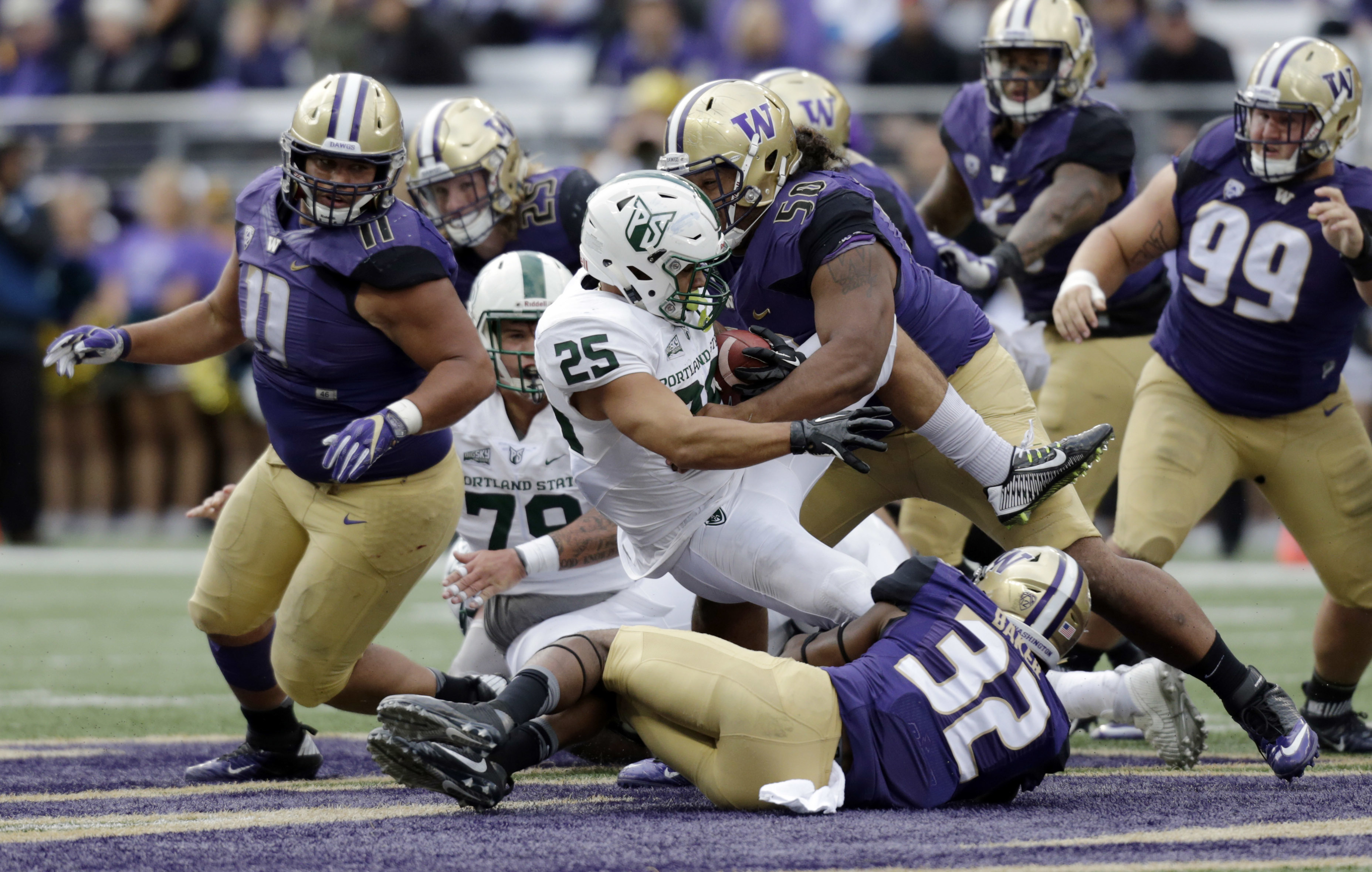There’s no time.
There never is.
Ask Chris Petersen if he’s taken a breather or even a few steps back to appreciate the long view, to appreciate what one of the brightest minds in college football has accomplished at his latest stop, and Washington’s head coach will respond with a couple of genuine laughs.
“I wish,” Petersen said.
A pause follows.
“I think that’s one of the tough things about this job or maybe the tough things about the nature of our personalities [as coaches],” he added. “I don’t know if we ever appreciate it.”
The tone this week is admittedly more circumspect than he would’ve liked, as the Huskies are coming off season-altering defeat at Stanford. Once considered a front-runner to repeat as one of the four college football playoff entrants, the No. 16 Huskies (8-2, 5-2) have slipped up twice this season, and in the parity-riddled Pac-12, that was enough to put dreams of another drive toward a national title out of reach.
But being in that conversation, being part of that speculation in of itself is a byproduct of Petersen’s impact at Washington. The Huskies are a national power these days. And all it took the former Boise State coach to get them there was three-and-a-half seasons on Lake Washington. In such a short amount of time, the Huskies have gone from conference upstart to a program others measure themselves by.
“It’s not always going to be a bed of roses,” Petersen said. “There’s no chance for feeling sorry for ourselves. Everybody in the conference and everybody else around is throwing a party [because] we lost.”
Utah at No. 16 Washington<br>When • Saturday, 8:30 p.m. MST<br>TV • ESPN
That sort of respect comes with a swift and steady rise.
At Boise State, Petersen went an astonishing 92-12 from 2006 to 2013, winning five bowl games. In the process as he became the face — along with Utah’s Urban Meyer and later Kyle Whittingham — of what was once known as a “BCS Buster.” In his fourth year at Washington, Petersen has already taken the Huskies to the Pac-12 pinnacle, winning the conference a year ago and earning a berth in the NCAA college football playoff.
Whittingham said this week there is no such thing as a coaching guru.
“There are recruiting gurus,” he said.
And Utah’s head coach considers Petersen one of the nation’s elite recruiters.
“Chris did a good job of that at Boise. Same thing [at Washington],” Whittingahm said. “There’s a system and a methodology to what they do. They know the type of guys they want to get into the program and target. And that’s, as I’ve said many, many, many, many times, [the] the name of the game in college football is recruiting and they do as good of a job as anybody in that regard.”
A year ago, the Huskies had four players taken in the first and second rounds of the NFL Draft. They returned one of the top quarterback talents in the country in junior Jake Browning (2,097 yards, 16 touchdowns, five interceptions), one of the top tailbacks in the Pac-12 in Myles Gaskin (1,038 yards rushing and 15 total touchdowns) and before falling at Stanford last week, had the nation’s No. 1 overall defense.

Washington defensive coordinator Pete Kwiatkowski, who was at Boise State with Petersen and was a defensive coordinator at Snow College in the late 1990s, has pieced together a tenacious defense since 2014. Despite losing three secondary starters to the draft, the Huskies didn’t miss a beat in 2017. The secondary has been hit by injuries this season, too, as starters Jordan Miller and Byron Murphy have missed significant time.
Defensive linemen Vita Vea and Greg Gaines are a premier duo in the middle of a defensive line that ranks Top-5 nationally. Whittingham called Vea “as good as there is in the country.”
“Their two inside players are dominant,” Colorado coach Mike MacIntyre said. “They’re that good.”
Whittingham said he’s seen similarities in the way Kwiatkowski constructed the Husky defense — staunch up front with play-making secondary in the back — to the way Utah built its foundation on defensive prowess.
“Pete Kwiatkowski does a great job,” Whittingham said. “I’ve had a lot of respect for him for a lot of years. He’s built great defenses wherever he’s been, and he’s certainly done a great job of that at Washington.”
Utah’s offense, which has yet to find a real groove in 2017, will line up against a motivated defense that was shredded in the second half by Heisman candidate Bryce Love, who finished with 166 yards on 30 carries against what was then the top defense in the country.
“We hear that their front seven is the best part of their defense,” wide receiver Samson Nacua said.

Tough sledding awaits.
Petersen acknowledged this week that even after wins, he can’t wait to speed home and turn on the film to point out spots on the field that can no longer afford errors. So after the loss at Stanford, a result that eliminated postseason hopes, Petersen turned on the tape and just came to the conclusion that his guys played hard, but fell short.
“I’m a bad loser,” he said. “That’s a flaw that I have.”
Even after turning off the film, he appreciated something. Even after a loss that significant, he admired the way his Huskies handled defeat.
Washington’s rise under Coach Pete<br>• Chris Petersen (2014-17): 35-16, 22-13 in Pac-12, 1-2 in bowl games.<br>• Steve Sarkisian (2009-2013): 34-29.<br>• Tyrone Willingham (2005-2008): 11-37.
Washington’s dominant defense<br>• Total defense: No. 4 nationally,, 3.92 yards per play, 257.4 yards allowed per game.<br>• Rushing defense: No. 4, 101.5 yards allowed per game.<br>• Scoring defense: No. 2, 13 points per game allowed.
















